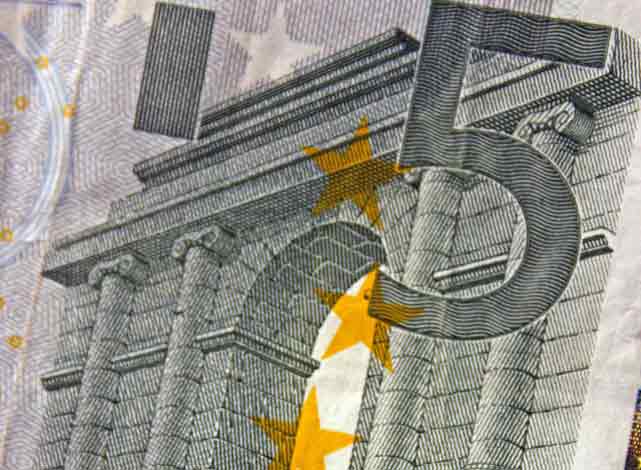Pound-to-Euro Forecast: Break of 1.1480 Signals Deeper Losses
- Written by
David Woodsmith

The Pound to Euro exchange rate (GBP/EUR) fell to six-week lows on Friday, slipping under the 1.1480–1.1500 support zone as fiscal worries and souring consumer confidence compounded pressure on Sterling.
A jump in UK government borrowing, weak sentiment surveys, and the Bank of England’s decision to hold rates at 4.00% all reinforced concerns over the outlook, leaving GBP/EUR vulnerable to a retreat towards July’s 1.1415 lows.
The Pound Sterling extended its slide against the Euro on Friday, dropping below 1.1470. The decisive break raises the risk of deeper losses, with traders eyeing a potential move towards July’s 1.1415 lows if confidence does not recover quickly.
Danske Bank warned that the medium-term outlook remains tilted against Sterling, noting;
“We expect EUR/GBP to move higher towards 0.89 on a 6–12-month horizon on a weakening of the UK growth outlook and a positive correlation to a USD-negative environment.”
The latest government borrowing data reinforced fiscal fears ahead of the November budget while a further retreat in consumer confidence soured the underlying mood.
The UK government borrowing requirement jumped to £18.0bn for August from £14.5bn the previous year. This was the highest August deficit for five years and well above Office for Budget Responsibility (OBR) estimates for the month.
For the first five months of the year, borrowing increased to £83.8bn from £67.6bn the previous year. In its latest update, the OBR forecast that the 5-month deficit would be £72.4bn.
Capital Economics chief UK economist Paul Dales noted; “Of course, what matter’s is what the OBR forecasts the current budget to be in 2029/30, which is when the Chancellor’s fiscal mandate bites.”
He added; “Our current estimate is that it will forecast a deficit of about £18bn, meaning the Chancellor will have to raise £28bn, mostly through higher taxes, if she wants to keep her buffer against her rule of £10bn.”
The Bank of England (BoE) decision to hold interest rates at 4.00% had limited overall impact.
Rabobank now expects that the BoE will hold rates until the first quarter of 2026 due to stubborn inflation pressure. This would tend to increase the focus on fiscal policy.
It added; “Skipping the November meeting would reinforce commitment to the 2% inflation target and signal a need for firmer progress on inflation. It also shifts focus to Chancellor Reeves ahead of the Autumn Budget.”
Elsewhere, the data provided no significant Pound support. August retail sales volumes increased 0.5%, marginally above consensus forecasts.
The GfK consumer confidence index, however, retreated to -19 for September from -17 the previous month and slightly below expectations of -18 with all five main components retreating on the month.
Neil Bellamy, Consumer Insights Director at GfK, an NIQ Company, commented; “There’s an autumnal chill in the air this month.”
He added; “Looking at the economy, sentiment is sliding sharply: in June 2024 our forward-looking measure stood at -11, but just 15 months later it has slumped to -32. With tax rises expected in the November budget, the risk is that confidence inevitably falls, just like the autumn leaves.”
STORY LINK Pound-to-Euro Forecast: Break of 1.1480 Signals Deeper Losses

The Pound to Euro exchange rate (GBP/EUR) fell to six-week lows on Friday, slipping under the 1.1480–1.1500 support zone as fiscal worries and souring consumer confidence compounded pressure on Sterling.
A jump in UK government borrowing, weak sentiment surveys, and the Bank of England’s decision to hold rates at 4.00% all reinforced concerns over the outlook, leaving GBP/EUR vulnerable to a retreat towards July’s 1.1415 lows.
GBP/EUR Forecasts: Dip to 6-Week Lows
The Pound Sterling extended its slide against the Euro on Friday, dropping below 1.1470. The decisive break raises the risk of deeper losses, with traders eyeing a potential move towards July’s 1.1415 lows if confidence does not recover quickly.
Danske Bank warned that the medium-term outlook remains tilted against Sterling, noting;
“We expect EUR/GBP to move higher towards 0.89 on a 6–12-month horizon on a weakening of the UK growth outlook and a positive correlation to a USD-negative environment.”
The latest government borrowing data reinforced fiscal fears ahead of the November budget while a further retreat in consumer confidence soured the underlying mood.
The UK government borrowing requirement jumped to £18.0bn for August from £14.5bn the previous year. This was the highest August deficit for five years and well above Office for Budget Responsibility (OBR) estimates for the month.
Save on Your GBP/EUR Transfer
Get better rates and lower fees on your next international money transfer. Compare TorFX with top UK banks in seconds and see how much you could save.
For the first five months of the year, borrowing increased to £83.8bn from £67.6bn the previous year. In its latest update, the OBR forecast that the 5-month deficit would be £72.4bn.
Capital Economics chief UK economist Paul Dales noted; “Of course, what matter’s is what the OBR forecasts the current budget to be in 2029/30, which is when the Chancellor’s fiscal mandate bites.”
He added; “Our current estimate is that it will forecast a deficit of about £18bn, meaning the Chancellor will have to raise £28bn, mostly through higher taxes, if she wants to keep her buffer against her rule of £10bn.”
The Bank of England (BoE) decision to hold interest rates at 4.00% had limited overall impact.
Rabobank now expects that the BoE will hold rates until the first quarter of 2026 due to stubborn inflation pressure. This would tend to increase the focus on fiscal policy.
It added; “Skipping the November meeting would reinforce commitment to the 2% inflation target and signal a need for firmer progress on inflation. It also shifts focus to Chancellor Reeves ahead of the Autumn Budget.”
Elsewhere, the data provided no significant Pound support. August retail sales volumes increased 0.5%, marginally above consensus forecasts.
The GfK consumer confidence index, however, retreated to -19 for September from -17 the previous month and slightly below expectations of -18 with all five main components retreating on the month.
Neil Bellamy, Consumer Insights Director at GfK, an NIQ Company, commented; “There’s an autumnal chill in the air this month.”
He added; “Looking at the economy, sentiment is sliding sharply: in June 2024 our forward-looking measure stood at -11, but just 15 months later it has slumped to -32. With tax rises expected in the November budget, the risk is that confidence inevitably falls, just like the autumn leaves.”
International Money Transfer? Ask our resident FX expert a money transfer question or try John's new, free, no-obligation personal service! ,where he helps every step of the way, ensuring you get the best exchange rates on your currency requirements.
TAGS: Pound Euro Forecasts
Comments are currrently disabled
Related Stories:
- Pound-to-Euro Rate Flat after Mixed German Data - February 25, 2026
- British Pound to Euro Forecast: Bailey’s Caution Lifts GBP Above 1.1450 - February 25, 2026
- Pound-to-Euro Volatile - February 24, 2026
- British Pound to Euro Forecast: BoE Testimony, By-Election Risks Ahead - February 24, 2026
- Pound to Euro Firms - February 23, 2026
- British Pound to Euro Forecast: GBP Supported as UK Retail Sales Surge - February 20, 2026
- Pound-Euro Flat - February 19, 2026
- British Pound to Euro Forecast: Inflation Falls, Yet GBP Vulnerable - February 19, 2026
- Pound to Euro Rebounds - February 18, 2026
Latest News:
- Pound-to-Euro Rate Flat after Mixed German Data - February 25, 2026
- British Pound to Euro Forecast: Bailey’s Caution Lifts GBP Above 1.1450 - February 25, 2026
- Pound Sterling to Dollar Forecast: GBP Above 1.35 on US Trade Chaos - February 25, 2026
- Pound Sterling Capped after Dovish Bailey Remarks - February 24, 2026
- Pound-to-Euro Volatile - February 24, 2026
- British Pound to Euro Forecast: BoE Testimony, By-Election Risks Ahead - February 24, 2026
- Pound to Dollar Forecast: GBP Reclaims 1.35 as Tariff Chaos Hits USD - February 24, 2026
- Pound to Euro Firms - February 23, 2026
- GBP/USD Forecast: Pound Sterling Firm but Political Risks Linger - February 23, 2026
- Pound to Euro Forecast: By-Election Jitters Put GBP on Defensive - February 23, 2026









